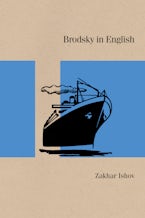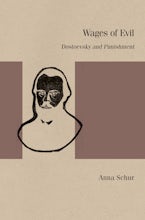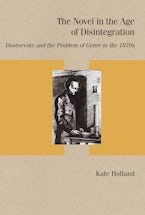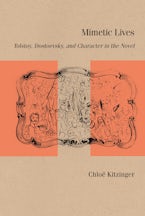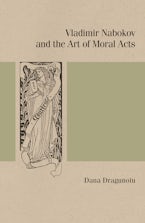LITERARY CRITICISM / Russian & Former Soviet Union
Showing results 1-10 of 130
Filter Results OPEN +

Revolutions in Verse
Studies in Russian Literature and Theory
This book shows how the early Soviet proliferation of interartistic modernist experiments and the emergence of new media technologies made poetry visible as a medium in its own right, taking seriously literature's transformative potential as a means of knowing and understanding the social world.
Brodsky in English
Studies in Russian Literature and Theory
An in-depth study of exiled Russian poet Joseph Brodsky’s translations of his own Russian poems into “new originals” in English offers a radical reappraisal of these works and of the project of translation itself.
Dostoevsky’s Provocateurs
Studies in Russian Literature and Theory
Challenging, revising, and expanding on Bakhtin's Problems of Dostoevsky's Poetics, Lynn Ellen Patyk demonstrates that provocation drives Dostoevsky's poetics of conflict, and she identifies the literary devices he uses to propel plot conflict and capture our attention.
Art in Doubt
Studies in Russian Literature and Theory
This book posits that Leo Tolstoy’s and Vladimir Nabokov’s seemingly antithetical aesthetics stem from the same fear—that one’s experience of the world might be entirely private and impossible to share through art.
The Origins of Russian Literary Theory
Studies in Russian Literature and Theory
Russian Formalism is considered the foundational movement of modern literary theory. This book reevaluates the school given the current commitment within literary studies to rethink the concept of literary form in cultural-historical terms.
The Letters and the Law
Studies in Russian Literature and Theory
Nineteenth-century Russian literature abounds in negative images of lawyers and the law. The Letters and the Law is the first book to frame the conflict between writers and lawyers as a competition for cultural authority.
Wages of Evil
Studies in Russian Literature and Theory
Anna Schur incorporates sources from philosophy, criminology, psychology, and history to argue that Dostoevsky’s thinking was shaped not only by his Christian ethics but also by the debates on punishment theory and practice unfolding during his lifetime.
The Novel in the Age of Disintegration
Studies in Russian Literature and Theory
In The Novel in the Age of Disintegration, Kate Holland shows that Dostoevsky aimed to use the form of the novel as a means of depicting the disintegration caused by various crises in Russian society in the 1860s.
Mimetic Lives
Studies in Russian Literature and Theory
What makes characters seem real? This book explores the ways Tolstoy and Dostoevsky created the illusion of autonomous characters, through techniques that paradoxically hindered the writers’ ambitions for the novel as a genre.
Vladimir Nabokov and the Art of Moral Acts
Studies in Russian Literature and Theory
The book advances an original and provocative argument about the formation, career, and legacies of Vladimir Nabokov, for whom artistic and moral acts served as testaments to free will.

Revolutions in Verse
Studies in Russian Literature and Theory
This book shows how the early Soviet proliferation of interartistic modernist experiments and the emergence of new media technologies made poetry visible as a medium in its own right, taking seriously literature's transformative potential as a means of knowing and understanding the social world.
Brodsky in English
Studies in Russian Literature and Theory
An in-depth study of exiled Russian poet Joseph Brodsky’s translations of his own Russian poems into “new originals” in English offers a radical reappraisal of these works and of the project of translation itself.
Dostoevsky’s Provocateurs
Studies in Russian Literature and Theory
Challenging, revising, and expanding on Bakhtin's Problems of Dostoevsky's Poetics, Lynn Ellen Patyk demonstrates that provocation drives Dostoevsky's poetics of conflict, and she identifies the literary devices he uses to propel plot conflict and capture our attention.
Art in Doubt
Studies in Russian Literature and Theory
This book posits that Leo Tolstoy’s and Vladimir Nabokov’s seemingly antithetical aesthetics stem from the same fear—that one’s experience of the world might be entirely private and impossible to share through art.
The Origins of Russian Literary Theory
Studies in Russian Literature and Theory
Russian Formalism is considered the foundational movement of modern literary theory. This book reevaluates the school given the current commitment within literary studies to rethink the concept of literary form in cultural-historical terms.
The Letters and the Law
Studies in Russian Literature and Theory
Nineteenth-century Russian literature abounds in negative images of lawyers and the law. The Letters and the Law is the first book to frame the conflict between writers and lawyers as a competition for cultural authority.
Wages of Evil
Studies in Russian Literature and Theory
Anna Schur incorporates sources from philosophy, criminology, psychology, and history to argue that Dostoevsky’s thinking was shaped not only by his Christian ethics but also by the debates on punishment theory and practice unfolding during his lifetime.
The Novel in the Age of Disintegration
Studies in Russian Literature and Theory
In The Novel in the Age of Disintegration, Kate Holland shows that Dostoevsky aimed to use the form of the novel as a means of depicting the disintegration caused by various crises in Russian society in the 1860s.
Mimetic Lives
Studies in Russian Literature and Theory
What makes characters seem real? This book explores the ways Tolstoy and Dostoevsky created the illusion of autonomous characters, through techniques that paradoxically hindered the writers’ ambitions for the novel as a genre.
Vladimir Nabokov and the Art of Moral Acts
Studies in Russian Literature and Theory
The book advances an original and provocative argument about the formation, career, and legacies of Vladimir Nabokov, for whom artistic and moral acts served as testaments to free will.


